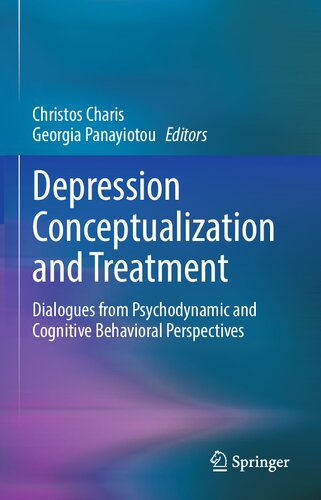

Most ebook files are in PDF format, so you can easily read them using various software such as Foxit Reader or directly on the Google Chrome browser.
Some ebook files are released by publishers in other formats such as .awz, .mobi, .epub, .fb2, etc. You may need to install specific software to read these formats on mobile/PC, such as Calibre.
Please read the tutorial at this link: https://ebookbell.com/faq
We offer FREE conversion to the popular formats you request; however, this may take some time. Therefore, right after payment, please email us, and we will try to provide the service as quickly as possible.
For some exceptional file formats or broken links (if any), please refrain from opening any disputes. Instead, email us first, and we will try to assist within a maximum of 6 hours.
EbookBell Team

4.3
28 reviewsDepression, a highly common clinical disorder, is an important and clinically relevant topic for both clinical researchers and practitioners to address, because of its prevalence, impact on the individual and society, association with other mental and physical health problems and the social contexts in which it develops. Depression ranks in Germany and central Europe as the third among the leading mental disorders and world-wide is a leading cause of disability. It is estimated that 8.3 % of the German population is depressed within a year (11.2 % women, 5.5 % men). These statistics mean that 4 million people per year are depressed in Germany alone (one year prevalence). According to the WHO, over 300 million people world-wide experience depression and in the USA the financial burden of this disorder, due to disability and work absenteeism, reaches Depression is also becoming more frequent over time and has a high risk of recidivism –particularly since its most common form, Major Depressive Disorder (DSM-5; ICD10) tends to occur in episodes. For example, 20% to 40% of people become depressed again within two years after their first depressive episode, meaning that a major aim of any therapeutic intervention should be to prevent future relapses. Depression also shows very high comorbidities with other mental and physical health conditions. Its overlap with anxiety pathology is so high that clinicians are concerned with whether the two disorder categories are indeed distinct or if they show substantial etiological overlap. Depression is also associated with heart disease and even cancer, making it a risk factor for mortality and morbidity that needs to be identified early and addressed effectively. In addition to Major Depressive Disorder, the often severe Bipolar Disorder, and the chronic form of Depression referred to as dysthymia are additional mood disorders that among them require careful differential diagnosis. They also lead to questions regarding their common